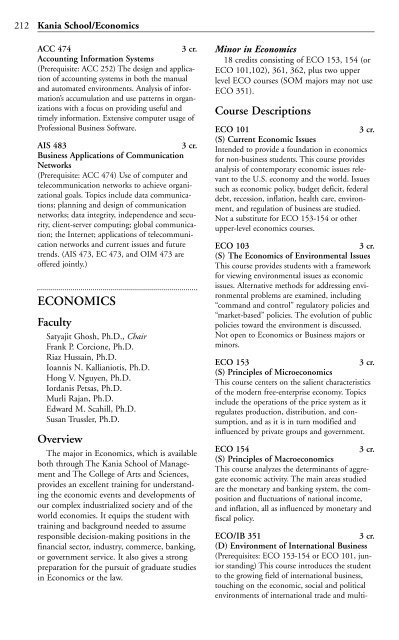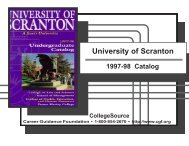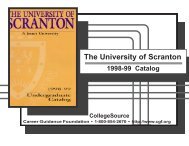2003-2004 - The University of Scranton
2003-2004 - The University of Scranton
2003-2004 - The University of Scranton
Create successful ePaper yourself
Turn your PDF publications into a flip-book with our unique Google optimized e-Paper software.
212 Kania School/Economics<br />
ACC 474 3 cr.<br />
Accounting Information Systems<br />
(Prerequisite: ACC 252) <strong>The</strong> design and application<br />
<strong>of</strong> accounting systems in both the manual<br />
and automated environments. Analysis <strong>of</strong> information’s<br />
accumulation and use patterns in organizations<br />
with a focus on providing useful and<br />
timely information. Extensive computer usage <strong>of</strong><br />
Pr<strong>of</strong>essional Business S<strong>of</strong>tware.<br />
AIS 483 3 cr.<br />
Business Applications <strong>of</strong> Communication<br />
Networks<br />
(Prerequisite: ACC 474) Use <strong>of</strong> computer and<br />
telecommunication networks to achieve organizational<br />
goals. Topics include data communications;<br />
planning and design <strong>of</strong> communication<br />
networks; data integrity, independence and security,<br />
client-server computing; global communication;<br />
the Internet; applications <strong>of</strong> telecommunication<br />
networks and current issues and future<br />
trends. (AIS 473, EC 473, and OIM 473 are<br />
<strong>of</strong>fered jointly.)<br />
ECONOMICS<br />
Faculty<br />
Satyajit Ghosh, Ph.D., Chair<br />
Frank P. Corcione, Ph.D.<br />
Riaz Hussain, Ph.D.<br />
Ioannis N. Kallianiotis, Ph.D.<br />
Hong V. Nguyen, Ph.D.<br />
Iordanis Petsas, Ph.D.<br />
Murli Rajan, Ph.D.<br />
Edward M. Scahill, Ph.D.<br />
Susan Trussler, Ph.D.<br />
Overview<br />
<strong>The</strong> major in Economics, which is available<br />
both through <strong>The</strong> Kania School <strong>of</strong> Management<br />
and <strong>The</strong> College <strong>of</strong> Arts and Sciences,<br />
provides an excellent training for understanding<br />
the economic events and developments <strong>of</strong><br />
our complex industrialized society and <strong>of</strong> the<br />
world economies. It equips the student with<br />
training and background needed to assume<br />
responsible decision-making positions in the<br />
financial sector, industry, commerce, banking,<br />
or government service. It also gives a strong<br />
preparation for the pursuit <strong>of</strong> graduate studies<br />
in Economics or the law.<br />
Minor in Economics<br />
18 credits consisting <strong>of</strong> ECO 153, 154 (or<br />
ECO 101,102), 361, 362, plus two upper<br />
level ECO courses (SOM majors may not use<br />
ECO 351).<br />
Course Descriptions<br />
ECO 101 3 cr.<br />
(S) Current Economic Issues<br />
Intended to provide a foundation in economics<br />
for non-business students. This course provides<br />
analysis <strong>of</strong> contemporary economic issues relevant<br />
to the U.S. economy and the world. Issues<br />
such as economic policy, budget deficit, federal<br />
debt, recession, inflation, health care, environment,<br />
and regulation <strong>of</strong> business are studied.<br />
Not a substitute for ECO 153-154 or other<br />
upper-level economics courses.<br />
ECO 103 3 cr.<br />
(S) <strong>The</strong> Economics <strong>of</strong> Environmental Issues<br />
This course provides students with a framework<br />
for viewing environmental issues as economic<br />
issues. Alternative methods for addressing environmental<br />
problems are examined, including<br />
“command and control” regulatory policies and<br />
“market-based” policies. <strong>The</strong> evolution <strong>of</strong> public<br />
policies toward the environment is discussed.<br />
Not open to Economics or Business majors or<br />
minors.<br />
ECO 153 3 cr.<br />
(S) Principles <strong>of</strong> Microeconomics<br />
This course centers on the salient characteristics<br />
<strong>of</strong> the modern free-enterprise economy. Topics<br />
include the operations <strong>of</strong> the price system as it<br />
regulates production, distribution, and consumption,<br />
and as it is in turn modified and<br />
influenced by private groups and government.<br />
ECO 154 3 cr.<br />
(S) Principles <strong>of</strong> Macroeconomics<br />
This course analyzes the determinants <strong>of</strong> aggregate<br />
economic activity. <strong>The</strong> main areas studied<br />
are the monetary and banking system, the composition<br />
and fluctuations <strong>of</strong> national income,<br />
and inflation, all as influenced by monetary and<br />
fiscal policy.<br />
ECO/IB 351 3 cr.<br />
(D) Environment <strong>of</strong> International Business<br />
(Prerequisites: ECO 153-154 or ECO 101, junior<br />
standing) This course introduces the student<br />
to the growing field <strong>of</strong> international business,<br />
touching on the economic, social and political<br />
environments <strong>of</strong> international trade and multi-
















